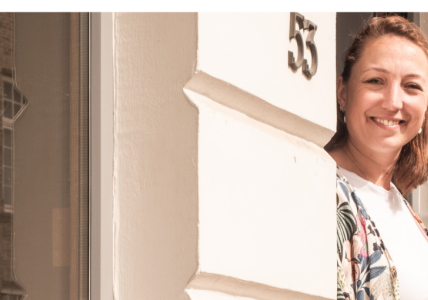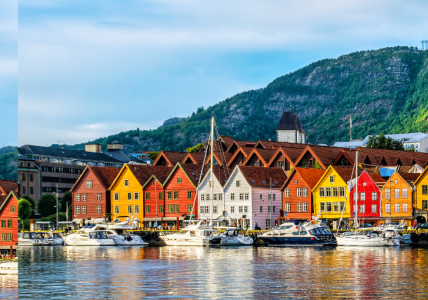The I2I project worked to increase social cohesion in North Sea Region neighbourhoods and communities. Having put loneliness on the political agenda, the project leaves a lasting legacy.
Loneliness and social isolation are not just harmful to mental and physical health. They can also have significant consequences for social cohesion and community trust.
In 2016, about 12 per cent of EU citizens felt lonely more than half of the time. In the first months of the COVID-19 outbreak, this number doubled.
Coincidentally, the project From Isolation to Inclusion kicked off around the same time that quarantines and social distancing transformed the way we lived.
What was supposed to be a project to enhance innovation in social service delivery, suddenly took on an even greater sense of urgency – even as the project partner meetings themselves were confined to seeing each other on the computer screens.
Partner highlights
“We are proud of what we have accomplished. One of the most important aspects of Interreg projects is learning from one another, and the partners in I2I has contributed to improve their communities in many ways these last years. I am also happy to see that emphasis on social isolation doesn’t end with the I2I project, but is continued by the partners”, says project manager Ragni Macqueen Leifson at the University of Agder in Norway.
We asked all the partners what project results they were the happiest with. Put together in this video, their top picks showcase many of the positive changes I2I has created in the North Sea Region. As the video shows, we found that not just the elderly need help to overcome social isolation. Partners in Denmark, Sweden and Scotland have worked specifically with young people, while the Dutch municipality of Assen found the middle-aged to be the most lonely age group.
Continued work in The Netherlands
“Our work on loneliness doesn’t stop now that the I2I project is ending. We have raised awareness of this important topic, but it remains a social problem. And I really think that we have set a movement in motion to give it ongoing attention”, says Jan Broekema, alderman in Assen.
“We continue to work on the plans that we made, and we are doing it together with the residents”, he adds.
Our aproach was characterised by listening.
In this video you can see some of the results from the I2I project in Gemeente Assen, from community theatre to neighbourhood cafés and a renovated park:
Happier by the water
“It gives people an opportunity to come out and experience nature on their doorstep. And in doing so, the project has helped people talk to one another and make connections to other groups in the community”, says Sharron Bright, community inclusion coordinator for Canal & River Trust in Leeds.
Canal & River Trust is a charity that works with volunteers and communities across England and Wales to transform canals and rivers into spaces where local people want to spend time and feel better.
“More than half of our network of canals and rivers run through urban areas, both small towns and larger cities. Many of these places are afflicted with higher-than-average deprivation”, says Chris Barnett, an enterprise manager for EU projects at the trust.
Canal & River Trust does a double service by working with volunteers and communities – creating social cohesion and meeting places – in transforming the canals and rivers into spaces where people want to spend time.
Our research shows that spending time by water, whether it be your lunchbreak, daily commute or just a weekend stroll, really can make us feel happier and healthier.
See some of the events the Trust has arranged as part of the I2I project:
Helping the elderly
The Belgian city of Turnhout has employed a link worker especially for the elderly. A link worker is reaches out to people in socially vulnerable situations whose needs are not met by the current services.
Our link workers don’t wait for people to come to them but have different ways of identifying those that need assistance. They also try to create a network around the vulnerable person.
The link worker will still be in place after the end of the I2I project. Learn more in this video interview with link worker Ils van Bouwel:
The municipality of Arendal in Norway is also helping elderly people feel more connected despite their shrinking network and restricted ability to get out and about.
The story of Gerald, a widower aged 94, is another example of how I2I makes a difference in people’s lives.
…and helping the young
Young people were also severely impacted by the covid-19 lockdowns, and several I2I partners worked to help this group.
Aarhus in Denmark started both a series of DIY workshops and a DIY community where young people could reach out to each other and create their own communities. In Scotland, students from Abertay university developed a computer game for tackling social isolation.
In addition to all the examples above, the I2I project has contributed to making life better for several North Sea Region communities in many small ways. You can read more about the contribution of the partners on the project website.

Young people making paper flowers at a DIY workshop in Aarhus set up through I2I. This initiative is continuing after project end.
The value of transnational cooperation
A big part of every Interreg project is that partners from different regions come together and learn from each other. Behind many of the results you have heard about in this article are many instances of inspiration and knowledge transfer.
Here are just some examples:
- Region Värmland’s introduction of service design methods has been a big help when designing initatives, material and co-creation tools.
- The University of Agder has been inspired by The Campaign to End Loneliness and their Promising Approaches Framework on loneliness developed in the UK, and uses the Campaign’s definition of loneliness.
- The idea of walking groups was taken up by Diakonisches Werk Bremen, Canal & River Trust and Värmland during the pandemic.
- The DIY clubs that started in Aarhus have been of interest and relevance to many of the project partners.
- Diakonisches Werk Bremen has been inspired by the use of virtual platforms in Denmark and Norway to change their online platforms.
- Abertay university has supported partners especially around baseline data collection on loneliness and other methods and approaches.
Our partnership faced challenges, starting up amid the Covid-19 lockdown. Our first partnership meeting was virtual. On the other hand, the pandemic underlined the need to tackle loneliness. Working together around this common goal, we managed to build a strong partnership that made a difference in communities across the North Sea Region.

How it all began...Starting amid the Covid-19 pandemic, the first I2I partnership meeting took place online. The pandemic underlined the need to tackle loneliness.
Top three project highlights
Making the contact
I2I showcased the great impact of atively reaching out to lonely people who may not be able to break the wall of loneliness themselves. This work will continue after project end.
Understanding the issue
I2I collected data identifying geographic clusters of loneliness and the most affected age groups. This allowed for a more targeted approach.
Building strong communities
I2I engaged communities in joint activities like events, walks, and workshops bringing people together. Several activities launched during I2I are set to continue.
Learn more
To find out more about I2I, visit the project website.
Contact
If you have further questions or would like to reach out to the project for whatever reason, please contact the project leader :
Ragni Leifsson
Center for E-health, University of Agder, Norway
Email: ragni.m.leifson@uia.no
Phone: +47 37 23 30 78 / +47 924 35 447
About the author

Walter Wehus works in the Division of communication at the University of Agder and has been the communication officer in the Isolation to Inclusion project.
He currently works on utilising AI to free up more time to drink coffee and consume print media, reasoning that a technology that is so bad at writing limericks can’t possibly be a threat to his job.



